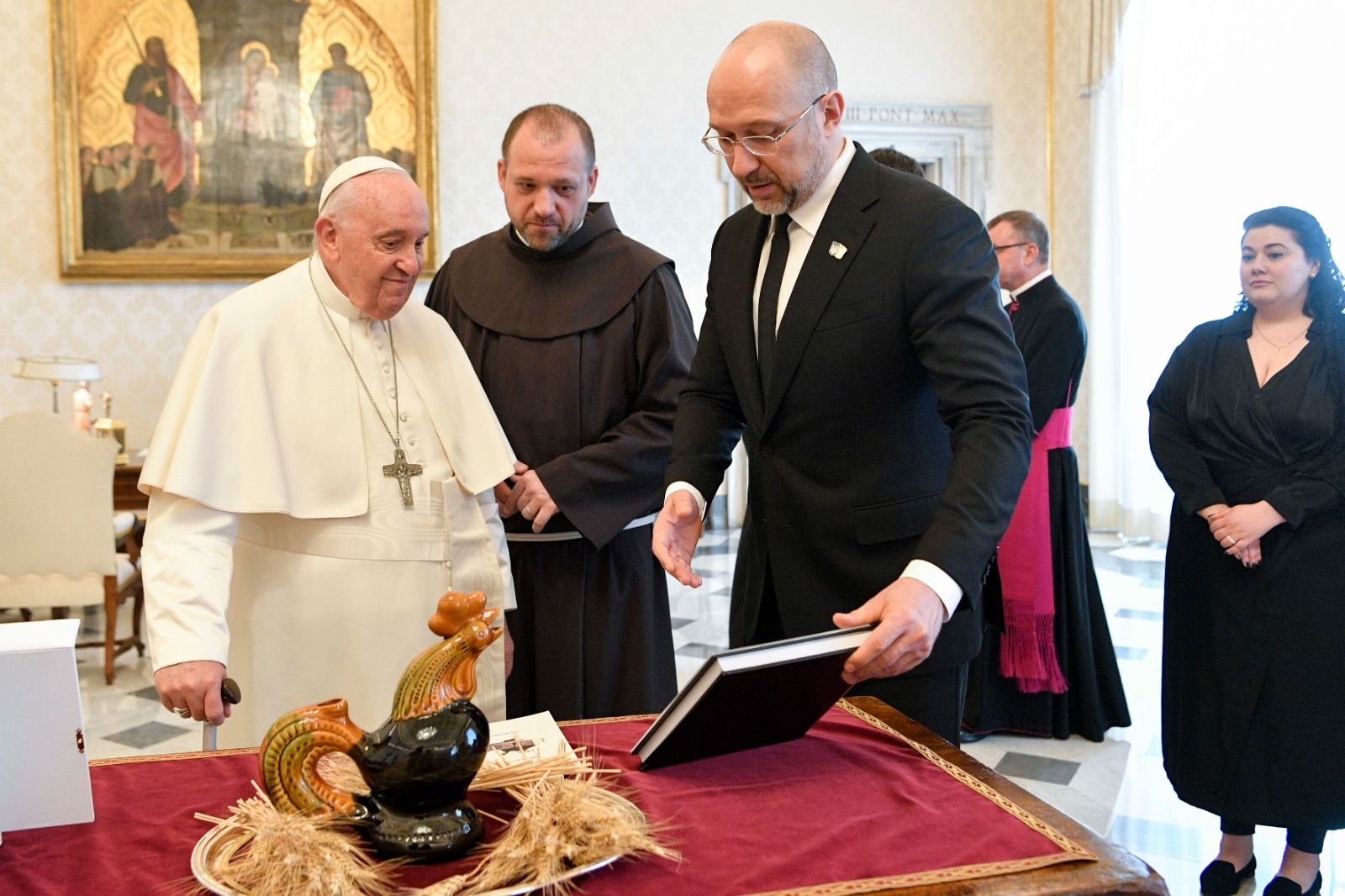Editor's Note: The Kyiv Independent is exclusively re-publishing an interview with Pavlo Smytsnyuk prepared by the Forum for Ukrainian Studies, a research publication for experts, practitioners, and academics to discuss, explore, reflect upon, develop, and transform international understanding of contemporary affairs in Ukraine. This platform is run by the Canadian Institute of Ukrainian Studies (CIUS) of the University of Alberta (Edmonton, Canada).
Pavlo Smytsynuk has been the Mary Seeger O’Boyle Associate Research Scholar at the Seeger Center for Hellenic Studies and the Department of Religion at Princeton University since the Russian invasion of Ukraine. He specializes in political theology and religious nationalism in Orthodox Christianity and has written extensively on the politicization of religion in the current Russo-Ukrainian war.
CIUS: Long before the Russo-Ukrainian war, the Vatican’s so-called Ostpolitik was controversial in Ukraine. Can you tell our readers what that policy entailed and what its legacies are today?
Smytsnyuk: Ostpolitik is a term used by scholars to refer to the Vatican’s or other Western churches’ approach to the USSR, other East European socialist governments, and the Russian Orthodox Church (ROC). Ostpolitik is a way for the Vatican to move beyond its alignment with the United States and other Western powers and toward a more impartial or neutral foreign relations role.
It is true that the Vatican was afraid of Communism in Italy and Europe in general, both preceding and following the Second World War. At the same time, the Vatican had certain reservations about capitalism and consumerism, and thus did not want to align itself unconditionally with the West. Therefore, at a certain point after WW II, the Holy See became open to dialogue with the Soviet bloc and started entertaining relations with it. The Vatican may have considered this as a way to move beyond the spirit of the Cold War but also as a strategy to ensure that Catholics had at least some freedoms in the socialist-bloc countries.
Finally, Ostpolitik coincided with the thriving of ecumenism—i.e., interconfessional dialogue—and a desire for church unity. It was a period in which relations with the Orthodox Churches, and specifically the ROC, were important for religious reasons. However, it is not clear to what extent the Vatican was aware of the ROC’s dependency on, or even weaponization by, the Kremlin in its ecumenical activity and how it had to negotiate every step it took with Moscow.
Sometimes this dialogue was perceived as detrimental to the interests of local Catholics in the region. For example, Pope John XXIII’s successful attempt to bring Russian Orthodox observers to the Second Vatican Council (accompanied by KGB agents) was not well received by the bishops from the Ukrainian diaspora, whose colleagues were imprisoned all around the USSR. The ROC also asked that the Council not criticize communism or the Soviet government—a request which was taken into account by the Vatican. At the same time, in this context of building trust between the Vatican and the ROC, and using the presence of Russian observers in Rome, the Vatican secured the liberation of the Ukrainian Greek Catholic Metropolitan Josyf Slipyj, who, after 17 years of imprisonment, was released and came to Rome.
The Second Vatican Council is a good example of the logic of Ostpolitik: the relationship between the Vatican and the ROC, and implicitly the Soviet government, offered a possibility for achieving some gains for Catholics in the East. At the same time, it offered a certain amount of legitimacy to the Soviet regimes and created a skewed impression that there was respect for religious freedom in these countries.
I think this approach fell a bit out of favour with John Paul II, who came from Poland and did not trust socialist governments. However, with Pope Francis Ostpolitik has come into the spotlight again, and we can see the problematic nature of the Vatican’s engagement with the ROC and the Russian government. Some points have remained unchanged since Soviet times, such as the denial of patriarchate status for the Ukrainian Greek Catholic Church—the largest of the Eastern Catholic Churches. Issues have also arisen in relation, for example, to the new autocephalous Orthodox Church of Ukraine (OCU), which was created in 2019 and recognized by the Ecumenical Patriarchate (but not the ROC). Although the Holy See has relations with every other autocephalous Orthodox church in the world, it has avoided taking any stance on the OCU. I believe this is the “price” they have paid (at Ukraine’s expense) for keeping open communications with Moscow in the ongoing war.
CIUS: You mentioned this attempt to remain neutral, and certainly the Vatican has tried to appear neutral in the Russo-Ukrainian war. How does this reflect its customary theology and policies? And what challenges has it faced in managing this particular war?
Smytsnyuk: The Vatican’s demonstrative “neutrality” has both a theological basis and more general political reasons. Theologically, catholic means universal, at least according to one possible explanation. As such, the Catholic Church tries to be a church for everybody—for people of every nation, of every ideology, every class, and so on. The Catholic Church sees its mission in the world to offer service to humanity—not only to the Catholics or even Christians but, in a way, to all of humanity. This is why Pope Francis has been so attentive to ecology; it is not strictly a Catholic matter but concerns everybody. Catholics are almost everywhere in the world—in Ukraine and also in Russia. The Vatican understands that anything it does could affect Catholics anywhere they live. In this context, being regarded as neutral and non-partisan is an important asset. At the same time, the Holy See’s neutrality protects it from interference by other powers and from being lobbied by them to take a side. It is not always a successful stance, but it seems to be an ideal that the Vatican strives to uphold.
This policy of neutrality was strongly criticized during the Second World War. The Vatican believed that criticizing the Soviet government would be used by Nazi propaganda and criticizing the Nazis would be used by Soviet propaganda. Today, historians and churchmen are rather critical of how the Vatican behaved during WW II. And I believe that many Ukrainians have read the neutrality of the Holy See in the present conflict through this lens of the Second World War.
One of the reasons why the Holy See wants to be neutral today is because it seeks to play a mediation role. One of the most recent examples during Pope Francis’ pontificate was the Vatican’s mediation between the USA and Cuba. Delegations from both countries travelled to Rome and held meetings on Vatican territory mediated by the Vatican’s Secretary of State, Cardinal Parolin, as a result of which a deal was finally brokered.
Due to the Vatican’s aforementioned spiritual aspirations, in addition to social and media pressures, the Pope wants to contribute to resolving the Russo-Ukrainian war. For this reason, he tries to maintain good relations with both Russia and Ukraine, although I do not know whether this is possible. You can see how after Pope Francis makes a statement supportive of Ukraine, he will follow it by saying something in praise of Russian culture, Dostoyevsky, or Orthodoxy. For example, a week after the Pope kissed a Ukrainian flag sent from the town of Bucha, he invited a Russian woman to hold a cross together with a Ukrainian woman during the Via Crucis [Way of the Cross] ceremony in Rome.
He tries to walk this very narrow path, but I do not see that he is reaching what he wants to achieve. It often seems that both parties are irritated by what the Pope says. Of course, part of the blame is Francis’ very idiosyncratic way of expressing himself and his relationship with the media, but I think this is a secondary issue. What is behind his approach is the desire to keep channels of communication open, and history will tell us whether he is wrong or right. So far, often Ukrainian Catholics have unquestionably been hurt by the Vatican’s approach to the conflict.
On the other hand, in certain regards no other power or international player has been more successful. We have seen several countries attempting to mediate between Ukraine and Russia, but they have failed to achieve much. Perhaps Turkey was the most successful, yet it managed to broker only a couple of things. Thus, we cannot say that the Pope is a failure while others make miracles. Nobody has managed to play an effective mediation role in this conflict, and it is probably because neither side is ready to sit and negotiate. Maybe, when the moment comes, there will be an opportunity for the Holy See to play some role in the process.
Read the full interview here.













